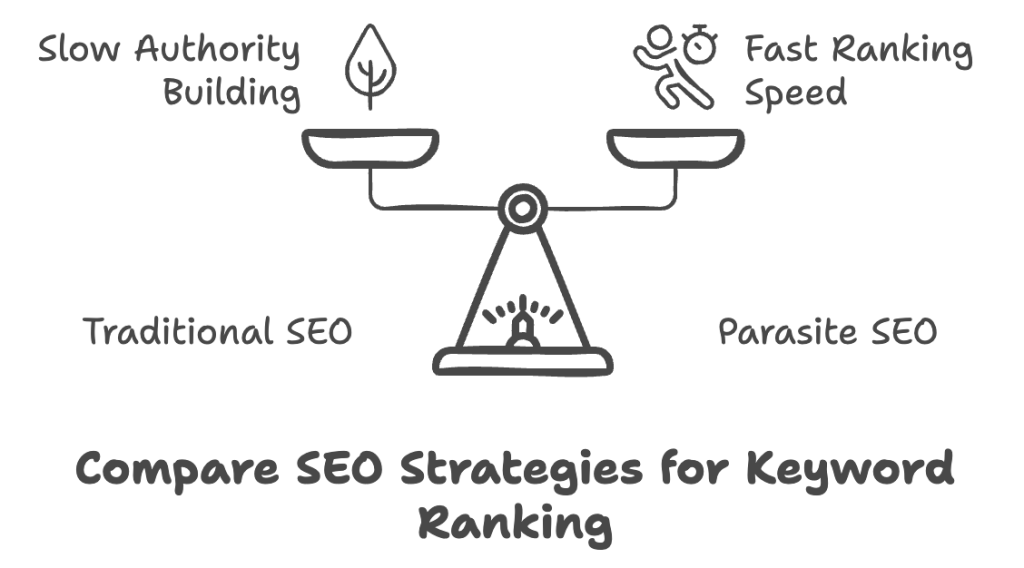
If you’ve been following SEO trends lately, you might have noticed a strange phenomenon: major news sites ranking for seemingly unrelated topics like “best crypto exchange” or “online casino reviews.” Welcome to the world of parasite SEO, a strategy that’s causing quite a stir.
But what exactly is parasite SEO, and why is everyone talking about it?
Let’s break it down in simple terms.
What Is Parasite SEO?
Parasite SEO is a strategy where you publish content on high-authority websites (the “host”) instead of your own website to rank quickly for competitive keywords.
Think of it like a small business operating inside a busy shopping mall – you’re leveraging the mall’s existing foot traffic rather than building your own standalone store.
In Simple Terms:
- Traditional SEO: Building your own website’s authority from scratch
- Parasite SEO: Borrowing authority from established websites to rank faster
For example, publishing an article on LinkedIn (third-party domain) instead of your company blog to rank for your target keywords.
Why Is It Getting So Much Attention?
Several factors have made parasite SEO a hot topic this year:
1. Google’s Recent Changes
- The August 2023 core update favored high-authority websites
- September’s helpful content update boosted user-generated content
- These changes accidentally made parasite SEO more effective
We wrote a guide on the “The Google Site Reputation Abuse [Parasite SEO] Policy”
2. Dramatic Success Stories
- Major publishers earning up to $25 million monthly using these techniques
- Small businesses ranking for competitive keywords within days
- Marketers achieving results that would take years with traditional SEO
3. Google’s Public Frustration
At a recent SEO conference, Google Search Engineer Gary Illyes expressed frustration about sites like Forbes ranking for keywords unrelated to their core topics – a direct result of parasite SEO tactics.
“I was frustrated that sites like Forbes.com are ranking for keywords that one would not normally associate with Forbes.com. A classic example of parasite SEO!”
How Does Parasite SEO Differ from Traditional SEO?
Let’s compare the key differences:
Traditional SEO
- Takes months or years to build authority
- Complete control over your content
- Long-term stability
- Higher initial investment
- Builds lasting brand value
Parasite SEO
- Can rank within days or weeks
- Limited control over platform
- Potential for sudden content removal
- Lower initial investment
- Faster results but less stability
Types of Parasite SEO
Free Platforms
- LinkedIn
- Cost: Free
- Best for: Professional topics
- Example: Business advice, industry insights
- Medium
- Cost: Free
- Best for: In-depth articles
- Example: Technical guides, analysis pieces
- Reddit
- Cost: Free
- Best for: Community discussions
- Example: Product reviews, how-to guides
- Quora
- Cost: Free
- Best for: Q&A knowledge sharing
- Example: Expert answers, personal experiences
- Amazon
- Cost: Free (for reviews and lists)
- Best for: Product-related content
- Example: Product reviews, buying guides
- YouTube
- Cost: Free
- Best for: Video content
- Example: Tutorials, vlogs, educational content
- SlideShare
- Cost: Free
- Best for: Presentations
- Example: Educational slides, business presentations
- Pinterest
- Cost: Free
- Best for: Visual content
- Example: Infographics, design inspiration
- GitHub
- Cost: Free
- Best for: Code and technical content
- Example: Code repositories, documentation
- Linktree
- Cost: Free
- Best for: Personal names
- Example: Social media links, portfolio links
Paid Platforms
- Major News Sites
- Cost: $5,000-$75,000 per article
- Best for: High-competition keywords
- Example: Financial advice, gambling reviews
- Industry Publications
- Cost: $350-$10,000 per article
- Best for: Niche topics
- Example: Technical reviews, industry analysis
The platforms above are great! But the hidden gems are the niche specific websites no one talks about. You can find a bunch with our tool and we have well over 100 domains you can buy posts in the Parasite SEO Tool.
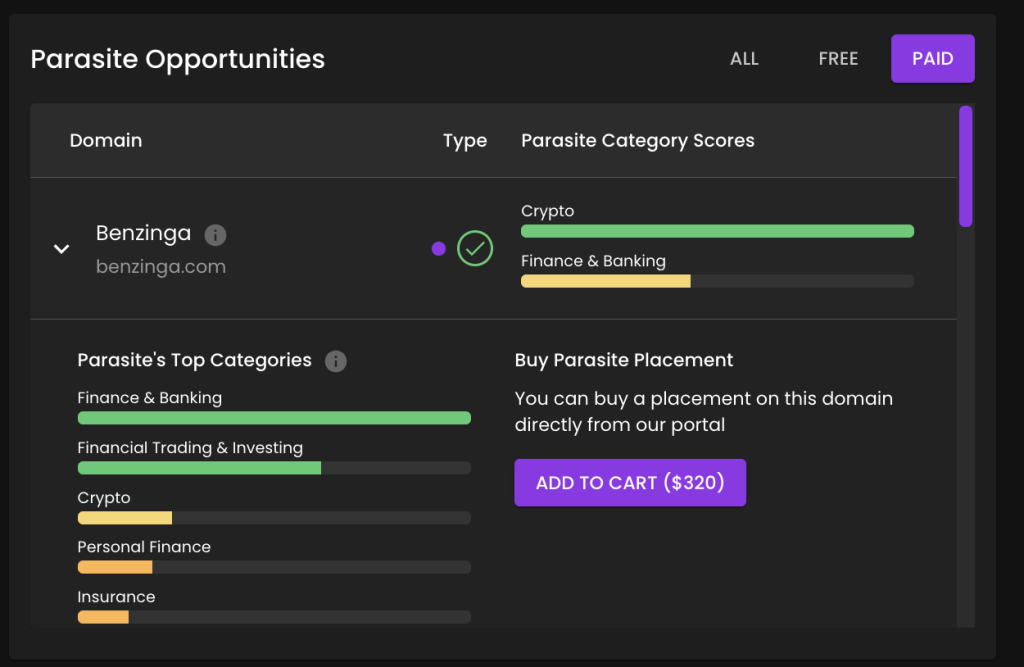
The Ethics and Risks
Ethical Considerations
Here are some questions that get asked alot…
- Is it fair to other website owners?
- Does it provide value to users?
- Are you being transparent about commercial relationships?
It’s 100% legal, and its ethicality depends on whether you believe Google has the right to be judge, jury, and executioner of the internet.
Potential Risks
- Platform Risks
- Content removal without notice
- Platform policy changes
- Loss of investment
- Google Risks
- Algorithm updates targeting parasite SEO
- Manual penalties
- Reputation damage
The Current Controversy with Google
The relationship between parasite SEO and Google is complicated:
Google’s Stance
- Publicly discourages the practice
- Struggling to combat it algorithmically
- Sending manual action notices to major publishers
Why It’s Hard to Stop
- Can’t penalize legitimate publishing
- High-authority sites are trusted
- Content often provides value to users
- Manual review isn’t scalable
Google actually took action against Forbes, thanks to an article saying they had a partner to publish content on their behalf.
Negative SEO seems to be social engineering now. Anyways. They received a manual penalty and the whole subfolder got deindexed.
A typical Google tactic. With parasite SEO it does happen occasionally but then they move the content to a new subfolder and it ranks again.
The fall of Forbes advisor.
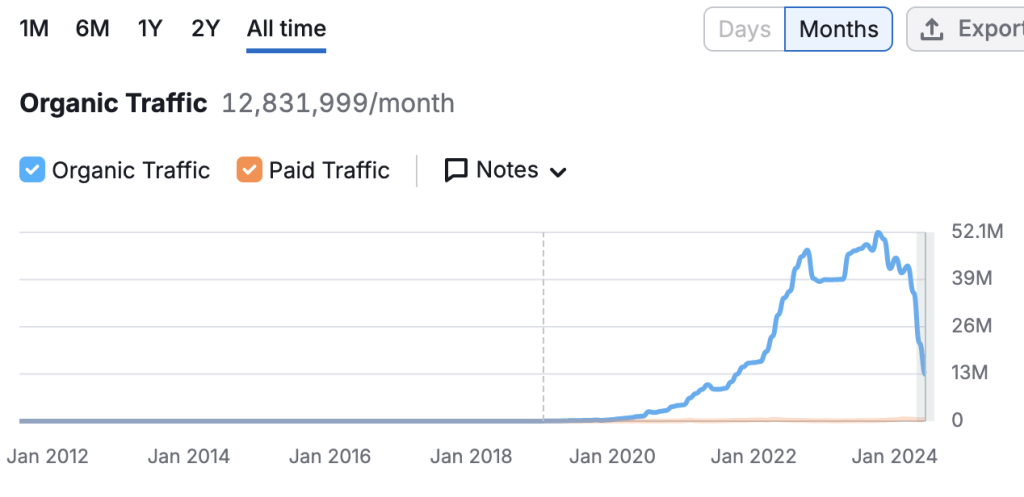
Then they changed subfolder and instantly started ranking (power of an authoritative domain).
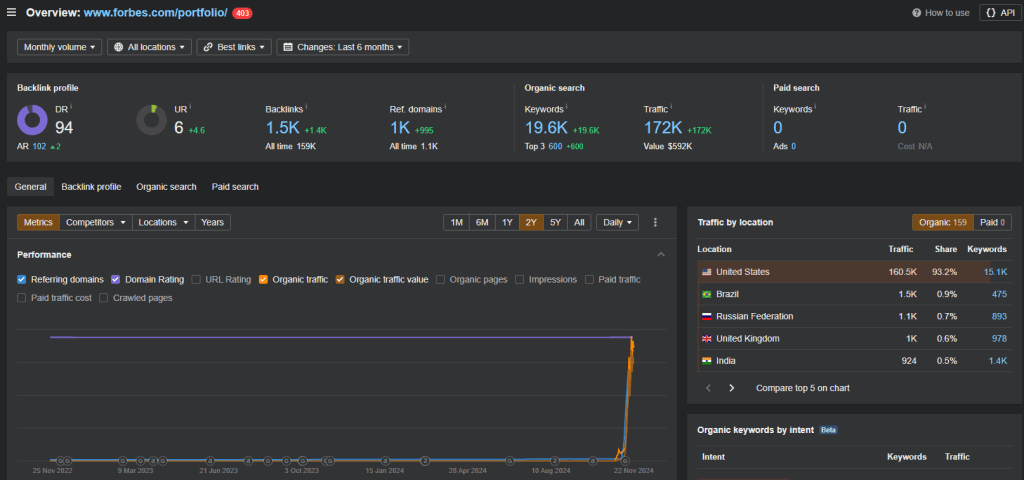
Google (probably) hitting that subfolder, or told Forbes to stop circumventing the Google manual action, as this clearly shows it was done manually not algorithmically.
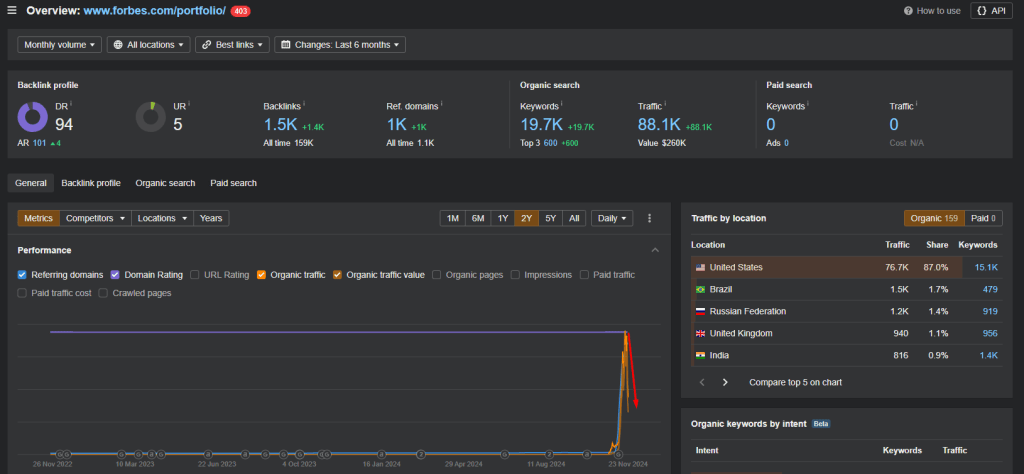
Google updating their T&Cs

All the other parasites I’ve seen are safe (outlookindia, jpost, and more), but Forbes is such a big company and are in the spotlight, Google are hitting them hard.
There are literally 1000’s of high authority domains still ranking in Google.
Should You Try Parasite SEO?
Good Candidates for Parasite SEO
- New businesses in competitive niches
- Limited SEO budget
- Need quick results
- Testing new markets
- Newsjacking, Eventjacking, Launchjacking etc
- ORM (Online Reputation Management)
Bad Candidates for Parasite SEO
- Established brands
- Long-term focus
- Need complete content control
- Heavy compliance requirements
Even though I’ve listed some items as bad candidates, I still think you should do parasite for established and long term focus.
It’s all about talking up as much SERP real estate as possible, and works for small and big budgets.
It’s a protective measure that can help take away clicks from your competitor and helps you be more stable in Google updates.
Getting Started Safely
If you decide to try parasite SEO, here’s how to do it ethically:
-
Choose the Right Platform
- Identify Your Niche
- Reverse Engineer Niche Parasites
- Understand platform rules
- Start with free options
Identify platforms that already rank well for your target keywords. Look for established domains like Medium, LinkedIn, or Mid Day that have strong domain authority and existing trust with Google.
When reverse engineering successful parasite SEO campaigns, pay special attention to platforms that consistently rank on page 1 for commercial intent keywords.
These are often the most profitable opportunities. For instance, if you see LinkedIn profiles regularly ranking for “SEO consultant” or “digital marketing expert”, that’s a strong signal.
Start with free platform options to test your approach before investing in paid solutions.
-
Create Quality Content
-
- Provide genuine value
- Include original insights
- Multi-Platform synergy
- Internally link content
Your primary goal is driving conversions. Structure your content with:
- A compelling call-to-action (CTA) in the intro
- Clear benefit statements above the fold
- Commercial-focused headlines that include buy intent keywords
- Strategic use of platform-native features to highlight offers
Write with purchasing intent in mind, using phrases like “best options for”, “top rated”, and “where to buy” to attract ready-to-convert traffic.
Keep your commercial content natural enough to avoid platform penalties while maintaining strong conversion elements like:
- Price comparisons
- Time-sensitive offers
- Social proof elements
- Clear next steps for the reader
Remember: The goal isn’t just traffic – it’s profitable traffic that takes action. Every piece of content should have a clear conversion path that’s visible without requiring much scrolling or clicking.
Internally linking content means creating a topical cluster of parasites on that single host website and internally link them.
Multi-Platform synergy means linking multiple assets on different websites together. I don’t recommend this, as it can be reverse engineered easily, and if one site gets hit then it could affect the other pages.
However, you can create similar articles and spread them across different assets.
-
Monitor Performance
-
- Track rankings
- Calculate Profitability
- Measure ROI
- Watch for platform changes
Use a short link tracker tool or a custom domain, and a rank tracker to track:
- Keyword rankings for your parasite pages
- Clicks of link
- Conversion rates from clicks to leads/sales
This will help give you an idea of ROI and where to improve or focus on in the future.
-
Diversify Strategies
-
- Don’t rely solely on parasite SEO
- Build your own assets too
- Spread risk across platforms
Don’t put all your eggs in one basket. While parasite SEO can be highly effective, it’s important to build a diverse digital presence.
This approach helps protect your business from platform changes and provides multiple traffic sources for sustainable growth.
Verdict on What is Parasite SEO?
Parasite SEO represents a powerful but controversial SEO tactic. While it can provide quick wins and impressive results, it’s important to understand both the opportunities and risks involved.
Remember: The best approach is usually a balanced one – consider parasite SEO as part of your overall strategy rather than your only strategy.
It works excellent in most niches with the most popular being the more grey/blackhat niches, because of money. However, SEO’s and agencies have been doing it for YEARS! Some people call it traffic leaks and barnacle SEO.
Key Takeaways:
- Understand the risks and rewards
- Start with free platforms
- Create valuable (converting) content
- Monitor results (ROI) closely
Have you tried parasite SEO? What has been your experience? To find high domains Google loves right now check out our AI Parasite SEO tool.

